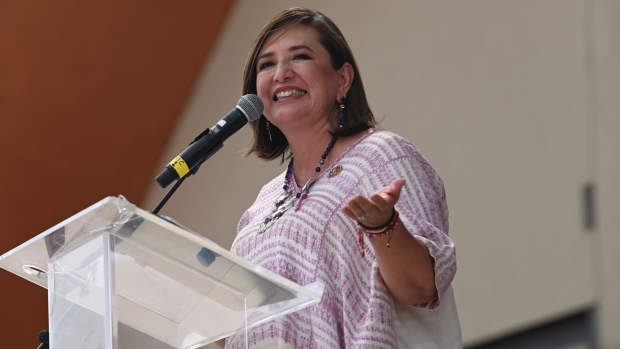Aug 30, 2023
Xochitl Galvez Will Challenge AMLO’s Party for Mexico Presidency
, Bloomberg News

(Bloomberg) -- Mexico’s opposition coalition is set to choose Xochitl Galvez as its presidential candidate to the 2024 election, pitting the strong-willed senator against a yet-to-be-named representative from the powerful ruling party of Andres Manuel Lopez Obrador.
Galvez, a businesswoman who led the commission for indigenous affairs in the early 2000s, will be the nominee for a coalition of three parties — PRI, PAN and PRD — that used to dominate Mexican politics until Lopez Obrador shook up the scene with his 2018 presidential victory.
The Frente Amplio Por Mexico said Thursday that it would formally task Galvez with leading the coalition’s efforts in the coming days, said Alejandra Latapi, a member of its coordinating committee. A day earlier, PRI president Alejandro Moreno said the party will support Galvez as a unity candidate for the coalition rather than its own senator Beatriz Paredes.
Paredes, the last challenger to Galvez for the nomination, came out second behind her rival in a series of polls designed to help deciding on the candidacy; she subsequently recognized her defeat late on Wednesday.
The pick of Galvez, a feisty opposition leader who has connected with younger voters thanks to her informal style, puts her on the challenging path to beat Lopez Obrador’s Morena party, which governs most of the country’s states and has a majority of seats in congress with its allies. The president isn’t eligible to seek reelection in June but his popularity, hovering around 60% after five years in government, has paved the way for his party to retain power.
Read More: AMLO’s Legacy Faces a Challenge Just as the World Shifts His Way
Former Mexico City Mayor Claudia Sheinbaum and ex-Foreign Affairs Minister Marcelo Ebrard are the two top candidates for Morena, which is expected to announce its nominee on Sept. 6. Polls give a solid advantage to Sheinbaum, who is also seen as the favorite of AMLO, as Lopez Obrador is commonly known.
Folksy Appeal
Galvez, who beat out a dozen competitors to get the opposition’s nomination, is in some ways an unconventional option, without a major federal post to make her a familiar face and a lack of government and party experience.
The race will not officially start until next year, but the 60-year-old senator along with Paredes and other presidential hopefuls from both coalitions have been touring the country to try to garner voters’ support. The coalitions have also made rhetorical efforts to avoid naming their top representative as official candidates, given the electoral law only allows the campaign season to start in March.
Nevertheless, Galvez managed to pull ahead with a histrionic campaign, including demanding to be let into the president’s morning press conference to confront AMLO over his comments about her and adopting the nickname “Ms. X” as a retort to the president’s suggestion that she was a nobody.
Political Challenges
Mexico’s politics have undergone significant change since AMLO started his six-year term, with the president successfully taking advantage of the bad reputation that the established parties have in the eyes of many Mexicans. Millions of voters were originally drawn to AMLO for his start in southern politics outside the traditional centers of power and his folksy demeanor, plus his jabs at past neoliberal reforms.
Yet the business-friendly PAN party and the PRI, which governed Mexico for most of the 20th century, have joined forces in the coalition known as the Frente Amplio Por Mexico, an attempt to revive their fortunes in the face of Morena’s electoral strength. Galvez’s background as a woman from a poor family who went on to start her own consulting company focused on technology solutions may now help galvanize this opposition to challenge the ruling party.
While most recent polls show Galvez clearly losing to Sheinbaum and Ebrard, a lot can still happen in the nine months to the election. The vote will also decide the composition of congress and some key local races including the capital, Mexico City.
“Galvez’s candidacy will have crucial implications in the campaigns for congress,” Eurasia analysts led by Matias Gomez Leautaud wrote in a note Wednesday. “She could raise the coalition’s support floor due to her charisma and lack of corruption scandals.”
Movimiento Ciudadano, a third party which governs the important states of Jalisco and Nuevo Leon, still has to decide on an electoral strategy amid speculation it may field its own candidate, which could hurt Galvez’s chances. A section of the party is arguing in favor of joining Galvez’s coalition, leading to recent internal political infighting.
If Sheinbaum is formally selected next week by Morena, it would be the first time that the two top candidates in Mexico’s election are women, increasing the chances the country will have a female president for the first time since its independence over 200 years ago.
(Updates with coalition event in third paragraph.)
©2023 Bloomberg L.P.








